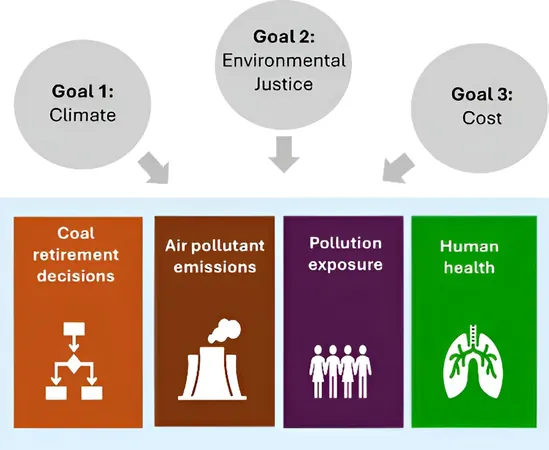
Rethinking Coal Plant Closures: A Path Towards Climate Justice and Equity
2024-10-09
Author: Olivia
As the United States faces a pivotal moment in energy production, coal-fired power plants are rapidly losing their foothold due to competition from inexpensive natural gas and a burgeoning renewable energy sector. However, a groundbreaking study from Princeton University reveals that the conventional approach to shutting down these coal plants, focused primarily on cost reduction, could overlook substantial climate and equity benefits.
Published in Environmental Science & Technology, the research emphasizes the necessity of shifting priorities in coal plant retirements. By centering strategies around climate initiatives and environmental justice, stakeholders can effectively reduce carbon emissions, air pollution, and pollution-related health threats, particularly in Pennsylvania and neighboring states.
"For a long time, energy policies have not explicitly prioritized environmental justice or climate objectives," states Carla Campos Morales, a prominent author of the study. "Our findings highlight the transformative potential of prioritizing carbon intensity and equity in deciding which coal plants to retire."
The research team identified that retiring just half of Pennsylvania’s coal plants could lead to a remarkable 12% decrease in CO2 emissions and a staggering 75% reduction in standard air pollutants. This proactive approach could save approximately 20% of lives that would otherwise be lost due to exposure to harmful fine particulate matter (PM2.5).
"We have a unique policy opportunity in the US right now to craft our retirement strategies that maximize benefits for both climate and communities," noted Wei Peng, the lead researcher and assistant professor at Princeton. This assertion rings true as the analysis illuminated varying outcomes based on the approach taken toward coal plant shutdowns.
Environmental Equity in Action
Delving into their analysis, the researchers created six distinct scenarios to evaluate the repercussions of retiring half of Pennsylvania’s coal plants. These were grouped by: closing the cheapest plants first, prioritizing those with the highest carbon emissions, or focusing on plants situated near environmental justice areas—those characterized by socioeconomic and racial disparities.
Despite updates in the definition of environmental justice zones since September 2023, the fundamental purpose of the study still resonates: strategically inching toward plant retirements in these impacted communities can significantly ameliorate both pollution levels and long-standing environmental injustices.
The team also assessed retirements based on two criteria: plant capacity and actual electricity generation. The findings uncovered that prioritizing underperforming plants could lead to notable air quality benefits, even if the inputs regarding potential energy output suggested minimal changes.
"For public health and environmental outcomes, it's crucial to consider not just the capacity for coal burning, but the reality of actual coal consumption," said Peng. As the analysis indicated, focusing on plants that actively contribute to pollution is essential for maximizing health benefits.
A Regional Perspective on Pollution Reduction
The researchers also tracked the ripple effects of Pennsylvania's coal retirements on neighboring states, including New Jersey and Delaware. An environmentally-conscious approach to coal retirements not only benefitted Pennsylvania but reduced harmful emissions across the broader region, potentially saving an additional 52 lives in states served by the PJM Interconnection.
"Our findings reveal the critical need for regional cooperation when establishing energy and environmental policy," emphasized Campos Morales. The study builds upon previous research examining Pennsylvania’s position within the broader context of the Regional Greenhouse Gas Initiative (RGGI)—an important cap-and-trade program that focuses on carbon reductions.
Actionable Insights for Policymakers
The focused goals of this project stem from engaging with Pennsylvania's policymakers and regulators, reflecting a commitment to actionable outcomes. Their research aims to inform climate policies that resonate with both environmental integrity and community well-being.
Looking ahead, the research team intends to broaden their analysis. They are keen to explore how such retirement decisions influence local employment, given coal’s long-standing role as a job provider in these regions. Retiring coal facilities may trigger energy production elsewhere, but this often results in job losses in the local coal communities.
"Communities can't just lose their jobs without a transition plan in place," Campos Morales noted. “It’s imperative that we consider how we can support former coal workers in finding new opportunities within the renewable energy sector or other industries."
With these findings and recommendations, Princeton University's research serves as a call to action for policymakers to align energy strategies with the pressing need for climate justice and community equity. As the transition away from coal progresses, it is essential that equity remains central to the narrative, paving the way for a sustainable and just energy future.









 Brasil (PT)
Brasil (PT)
 Canada (EN)
Canada (EN)
 Chile (ES)
Chile (ES)
 España (ES)
España (ES)
 France (FR)
France (FR)
 Hong Kong (EN)
Hong Kong (EN)
 Italia (IT)
Italia (IT)
 日本 (JA)
日本 (JA)
 Magyarország (HU)
Magyarország (HU)
 Norge (NO)
Norge (NO)
 Polska (PL)
Polska (PL)
 Schweiz (DE)
Schweiz (DE)
 Singapore (EN)
Singapore (EN)
 Sverige (SV)
Sverige (SV)
 Suomi (FI)
Suomi (FI)
 Türkiye (TR)
Türkiye (TR)